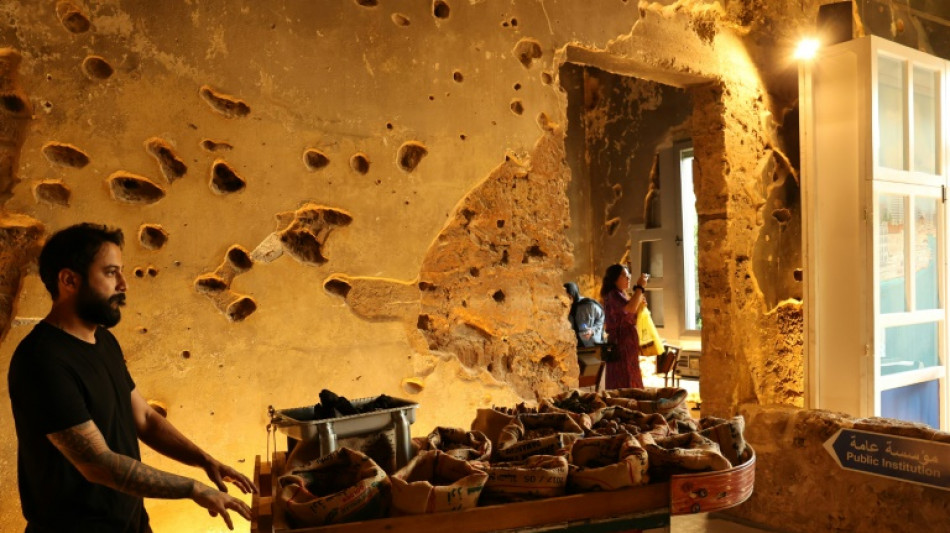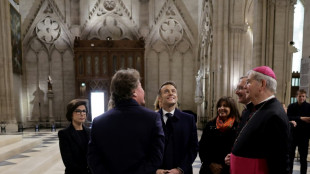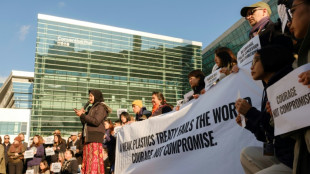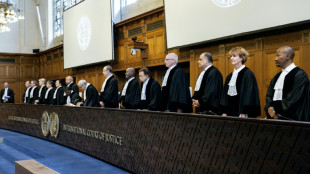
-
 Amorim puts faith in Mount to turn around Man Utd career
Amorim puts faith in Mount to turn around Man Utd career
-
Guardiola will not 'run' from Man City rebuild

-
 Assisted dying campaigners, opponents rally at UK parliament
Assisted dying campaigners, opponents rally at UK parliament
-
Durable prop Healy set to carve name in Irish rugby history

-
 Macron unveils Notre Dame after 'impossible' restoration
Macron unveils Notre Dame after 'impossible' restoration
-
Traumatised Spain marks one month since catastrophic floods

-
 Yen rallies, euro up on rising inflation data
Yen rallies, euro up on rising inflation data
-
Attack-minded Spurs boss Postecoglou says: 'You'll miss me when I'm gone'

-
 Syria jihadists, allies shell major city Aleppo in shock offensive
Syria jihadists, allies shell major city Aleppo in shock offensive
-
Macron inspects 'sublime' Notre Dame after reconstruction

-
 Arsenal must be near-perfect to catch Liverpool, says Arteta
Arsenal must be near-perfect to catch Liverpool, says Arteta
-
Arrests, intimidation stoke fear in Pakistan's politics

-
 Showdown looms on plastic treaty days before deadline
Showdown looms on plastic treaty days before deadline
-
Ngozi Okonjo-Iweala: the WTO's trailblazing motivator

-
 WTO chief reappointed as Trump threat looms
WTO chief reappointed as Trump threat looms
-
US landmine offer to Ukraine throws treaty into 'crisis': campaign group

-
 British MPs debate contentious assisted dying law
British MPs debate contentious assisted dying law
-
Macron offers first glimpse of post-fire Notre Dame

-
 Syria jihadists, allies shell Aleppo in shock offensive
Syria jihadists, allies shell Aleppo in shock offensive
-
Japan government approves $92 bn extra budget

-
 Toll in Syria jihadist-army fighting rises to 242: monitor
Toll in Syria jihadist-army fighting rises to 242: monitor
-
UK transport secretary quits in setback for Starmer

-
 Days before deadline, plastic treaty draft highlights disagreement
Days before deadline, plastic treaty draft highlights disagreement
-
Crypto boss eats banana art he bought for $6.2 million

-
 Teen news boss criticises Australian social media ban
Teen news boss criticises Australian social media ban
-
Taiwan detects 41 Chinese military aircraft, ships ahead of Lai US stopover

-
 Spain urged to 'build differently' after deadly floods
Spain urged to 'build differently' after deadly floods
-
WTO chief faces heavy task as Trump threat looms

-
 Herbert takes control at Australian Open as Smith tanks
Herbert takes control at Australian Open as Smith tanks
-
Israel PM again warns Iran after top diplomat talks of revising nuclear doctrine

-
 Brilliant Brook's 132 puts England on top against sloppy New Zealand
Brilliant Brook's 132 puts England on top against sloppy New Zealand
-
Brilliant Brook's 132 puts England on top against New Zealand

-
 US landmine offer to Ukraine throws global treaty into 'crisis': campaign group
US landmine offer to Ukraine throws global treaty into 'crisis': campaign group
-
Singapore hangs 4th person in three weeks

-
 Five things to know about NewJeans' shock split from agency
Five things to know about NewJeans' shock split from agency
-
Waste pickers battle for recognition at plastic treaty talks

-
 Ireland votes in closely fought general election
Ireland votes in closely fought general election
-
Top UN court to open unprecedented climate hearings

-
 European countries that allow assisted dying
European countries that allow assisted dying
-
British MPs to debate contentious assisted dying law

-
 Schmidt not expecting hero's welcome on Ireland return
Schmidt not expecting hero's welcome on Ireland return
-
PSG stuck between domestic dominance and Champions League woes

-
 'Hot fight' as unbeaten Bayern visit Dortmund fortress
'Hot fight' as unbeaten Bayern visit Dortmund fortress
-
Bordeaux-Begles' Samu 'not finished yet' with Wallabies

-
 Brook and Pope half-centuries haul England to 174-4 against NZ
Brook and Pope half-centuries haul England to 174-4 against NZ
-
Yen rallies on rate hike bets as equity markets swing

-
 Ukraine superstar Mahuchikh brings 'good vibes' to her war-torn country
Ukraine superstar Mahuchikh brings 'good vibes' to her war-torn country
-
PlayStation at 30: How Sony's grey box conquered gaming

-
 Saudi Arabia hosts UN talks on drought, desertification
Saudi Arabia hosts UN talks on drought, desertification
-
PlayStation: Fun facts to know as Sony's console turns 30


Lebanon's past echoes its grim present in exhibition
In a war-scarred Beirut heritage house turned museum, archives of Lebanon's troubled past fuse with artistic depictions of its grim present to portray a country seemingly in perpetual turmoil.
Newspaper clippings, film negatives and diary entries from the years before Lebanon's 1975-1990 civil war tell a story of government corruption, public sector strikes and student protests.
They are shown alongside contemporary pictures, video footage and art installations illustrating today's Lebanon, in the grip of political paralysis and its worst ever economic crisis.
"Allo, Beirut?", which premiered Thursday and runs until 2023, seeks to map out the decades-old rot at the heart of Lebanon's downward spiral, said the exhibition's director Delphine Abirached Darmency.
"It's strange sometimes to explain what we are experiencing without knowing what happened in the past," she said.
"Beirut is suffering, we are suffering," she added, arguing that much of Lebanon's misery is rooted in the problems of a bygone era.
The exhibit was born in part from the discovery of the archives of late billionaire Jean Prosper Gay-Para, who owned the once-famous Les Caves du Roy nightclub and is widely regarded as a symbol of Lebanon's pre-civil war golden era.
"Those sick minds, obsessed with making money," Gay-Para writes about the country's political elite, in a text on display.
That sentiment is still widely shared by a population battered by the unprecedented economic crisis that is widely blamed on the country's business and political barons.
Gay-Para "was talking in the 1960s about what we are living today", Darmency said.
- 'Condition of loss' -
More than three decades after the devastating civil war, Lebanon is reeling from a financial crisis that has seen poverty spike as the currency has lost more than 90 percent of its value on the black market.
Beirut also remains scarred by the huge 2020 portside blast of a pile of ammonium nitrate that killed more than 200 people and compounded a population exodus of a similar scale to that of the civil war period.
In addition to the archive material, the show features installations by young Lebanese artists who were asked to express their feelings about their city.
Rawane Nassif made a short documentary about the Beirut neighbourhood she grew up in, and to which she returned this year after two decades away to take care of her sick parents, both of whom have since died.
"The movie depicts the condition of loss," the 38-year-old anthropologist and filmmaker told AFP. "Beirut is in mourning. It is mourning the death of its people and the death of all the chances it once had."
Visual artist Raoul Mallat, 28, also explored the theme of grief, in a short film combining archive family footage from his childhood with recent shots of Beirut.
"This project helped me a lot in grieving some aspects of my city that I will not find again," he said.
- 'Built on rubble' -
The venue for the exhibit is itself a testament to Lebanon's complicated past. The three-storey Beit Beirut, known as the Yellow House, was built in the 1920s by renowned architect Youssef Bey Aftimos.
Riddled with bullet holes and other civil war damage, it stands alongside what used to be known as the "Green Line" that separated Beirut's Muslim and Christian districts during the conflict.
It was renovated and turned into a museum and cultural space that temporarily opened in 2017. It closed again due to difficulties, but the new exhibit has once more opened it to the public.
Holes in the walls once used by wartime gunmen have been fitted with screens showing footage of the unprecedented protest movement of 2019 that demanded sweeping political change before it ran out of steam.
One of the rooms is decorated with worn-out furniture and destroyed objects collected from the now-abandoned Les Caves du Roy nightclub in an attempt to recreate the space from Beirut's heyday.
The installation by Lebanese artists Rola Abu Darwish and Rana Abbout aims to make a symbolic statement about rubble and Lebanon's tumultuous existence.
"Beirut is built on rubble," said Abu Darwish, 38. "One of the main elements of Beirut to me is rubble.
"It's part of where we live, how we live, and who we are. And I feel that in the direction we're going, we are going to be making more rubble."
Y.Bouchard--BTB
